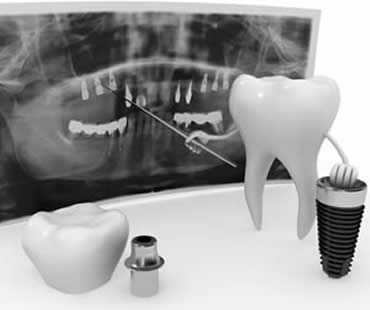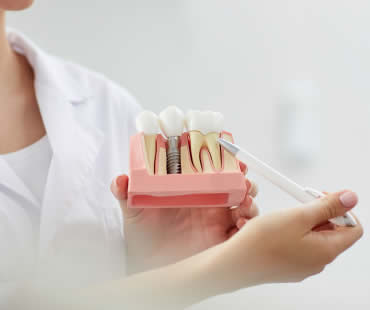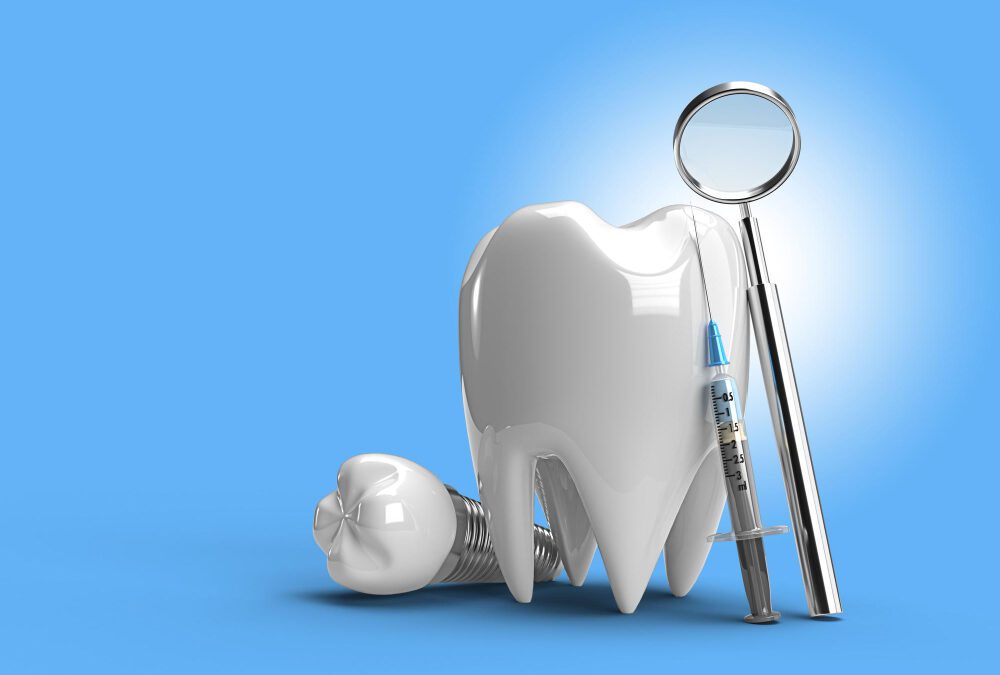
Apr 18, 2024 | Blog, Dental Topics 3, Implant Dentistry
Dental implants are the state-of-the-art restorative solution for missing teeth. They provide a stable base that is the next best thing to a natural tooth root. Because of this and other qualities, dental implants are rising in popularity each year as more and more people discover their convenience and stability.
Dental implants are replacement teeth, typically made of porcelain or a similar material, mounted on top of a titanium screw that is embedded into a patient’s jawbone. Over time, this screw will fuse directly with the bone in a process known as ossification. This fusion creates a tooth base that is so stable, it’s as good as a tooth’s natural roots.
Dental bridges can become dislodged and food may collect under the bridge, leading to discomfort and bacteria build-up. A dental implant goes all the way down, so there’s no “under” underneath to collect food and cause problems.
Most tooth restorations necessitate special ways of cleaning or flossing, and you have to be careful you’re doing all the right things to maintain your teeth properly. You care for a dental implant the same way you do for a natural tooth, by brushing and flossing, so you don’t even have to think about it when you’re cleaning your mouth.
The bones in your jaw are only healthy as long as you have healthy tooth roots in them. The tooth roots stimulate the bone, signaling it to stay full and healthy. Without the stimulation of the roots, the bone begins to shrink away. Dental implants preserve bone by acting as artificial tooth roots. The jawbone can’t tell the difference, and the bone stays strong and robust.
These factors and more are leading patients to turn to dental implants to address their missing teeth. Talk to your cosmetic dentist to see why dental implants are the perfect choice for you.
Take the first step towards optimal oral hygiene. Reserve your dental appointment at our Bingham Farms dental office now and experience personalized care.

Feb 15, 2024 | Blog, Dental Topics 4, Implant Dentistry
What are Dental Implants
Dental implants are artificial teeth that are surgically placed in the jawbone to support a dental prosthesis, such as a crown, bridge or denture. They are made of titanium or other materials that are compatible with the body and can fuse with the jawbone in a process known as osseointegration. This creates a strong and stable foundation for replacement teeth that look, feel and function like natural teeth.
The Importance of Dental Implants
Dental implants have revolutionized the field of dentistry by providing a long-lasting solution for missing teeth that is both functional and aesthetic. Missing teeth can lead to a variety of problems, including difficulty eating and speaking, bone loss in the jaw, shifting of remaining teeth and decreased self-confidence.
Dental implants can help prevent these problems by restoring the natural appearance and function of your smile. In addition, dental implants can improve your overall quality of life by allowing you to eat your favorite foods with ease, speak clearly without fear of slippage and smile confidently without feeling self-conscious about missing teeth.
Who can get dental implants?
Eligibility criteria for getting dental implants
Dental implants have become a popular option for individuals who are missing one or more teeth. However, not everyone is an ideal candidate for this procedure.
If you are considering getting dental implants, you must meet certain eligibility criteria before proceeding with the treatment. Firstly, you need to have healthy gums and enough bone density to support the implant.
Dental implants are anchored into the jawbone and require a strong foundation for support, so if there is not enough bone present in your jaw, a bone graft may be necessary to build up the area. Secondly, good overall health is essential.
Any underlying medical conditions such as diabetes or heart disease should be well managed before undergoing surgery. Smoking can also affect the success rate of dental implant surgery and may disqualify you from receiving them altogether.
Factors that affect eligibility
Apart from meeting specific eligibility requirements, other factors may also impact your potential candidacy for dental implant surgery. For example, age can play a role in determining suitability for this treatment option. While there is no upper age limit for receiving dental implants, older adults may require additional testing or medical clearance before undergoing the procedure.
Additionally, lifestyle factors such as poor oral hygiene practices or heavy alcohol consumption could potentially impact your candidacy for dental implant surgery. These behaviors increase the risk of complications during and after surgery and will need to be addressed before proceeding with treatment plans.
It’s important to remember that each individual’s situation is unique when deciding whether or not to pursue dental implant treatments. Consulting with an experienced dentist who specializes in this type of procedure will help determine whether you qualify and what steps need to be taken beforehand to achieve long-term success with your new teeth replacement solution.
How are dental implants placed?
Dental implant placement is a surgical procedure that involves inserting a titanium post into the jawbone to support an artificial tooth. The procedure is performed in several stages and can take several months to complete.
Step-by-step procedure for placing a dental implant
The first step in the dental implant placement process is a consultation with a dentist or oral surgeon to determine if the patient is eligible for the procedure. Once eligibility has been established, the dentist will create a treatment plan that outlines each stage of the process. During the first stage of surgery, an incision is made in the gum tissue to expose the jawbone.
A hole is then drilled into the bone where the titanium post will be inserted. Once in place, a cover screw or healing cap will be placed over the post and gum tissue will be stitched closed around it.
Over time, usually 4-6 months, bone tissue will grow around and fuse with the implanted post – a process called osseointegration.. After this period of time has passed, another surgery may be required to uncover and attach an abutment (a connector piece) onto which your replacement tooth can eventually be fitted. Once your healing from this surgery has completed successfully (generally several weeks), impressions of your teeth are taken and used to create your new crown (tooth).
Anesthesia options during placement
The level of anesthesia required during dental implant placement depends on each patient’s individual needs and preferences as well as on what their doctor recommends as best for them after discussing different options. Most people who undergo dental implant placement opt for some form of sedation or anesthesia during their surgery.
There are three main types of sedation that may be used: local anesthesia (which numbs only one area), nitrous oxide (“laughing gas”) which helps you relax and feel more comfortable during the procedure, and general anesthesia (which puts you into a deep sleep). Your dentist will help you decide which option is best for you based on your medical history, overall health and the complexity of the surgery.
Risks and Complications of Dental Implants
Dental implants are one of the most effective tooth replacement options available today. They provide a permanent solution to missing teeth that can restore your smile and improve your quality of life. However, like any invasive medical procedure, dental implant surgery does carry some risks and potential complications.
Ways to Minimize Risk of Complications
The good news is that there are several steps you can take to minimize your risk of complications during and after dental implant surgery:
- Choose an experienced dentist who specializes in dental implants – this will ensure that you receive proper treatment from a qualified professional
- Maintain good oral hygiene before and after surgery – this will help prevent infections from developing in your mouth
- Avoid smoking – smoking has been linked to increased risk for complications after dental implant surgery
- Frequently visit your dentist for follow-up appointments
- Take prescribed medications as directed by your dentist
By following these steps, you can help ensure a successful dental implant procedure with minimal complications. While dental implant surgery does carry some risks and potential complications, these can be minimized by taking the proper precautions. By choosing an experienced dentist, maintaining good oral hygiene, avoiding smoking, and following your dentist’s instructions carefully, you can help ensure a successful outcome for your dental implant procedure.
The Lifespan of Dental Implants
How Long Do Dental Implants Last?
Dental implants are designed to be a permanent solution for missing teeth. The lifespan of a dental implant can vary depending on a variety of factors.
However, with proper care and maintenance, dental implants have the potential to last for many years. According to the American Academy of Implant Dentistry, dental implants have a success rate of up to 98%, making them one of the most successful procedures in dentistry.
Average Lifespan of a Dental Implant
The average lifespan of a dental implant is around 25 years or more. This estimate is based on studies that have followed patients with dental implants over an extended period. However, some patients have reported having their implants for 30 years or more without any complications.
Factors That Affect the Lifespan of a Dental Implant
Several factors can affect how long a dental implant lasts, including: Bone density: Patients with low bone density may require additional procedures such as bone grafting, which can increase the success rate and lifespan of an implant. Oral hygiene: Good oral hygiene habits such as brushing and flossing regularly can help prevent gum disease and other oral infections that could lead to implant failure.
Tobacco use: Smoking and using other tobacco products increases the risk of complications during surgery and can also interfere with the healing process after surgery. Dental habits: Habits such as grinding or clenching teeth can put pressure on the implant, which could cause it to loosen or fail over time.
It’s important to discuss all these factors with your dentist before getting an implant so they can evaluate if you are eligible for this procedure. Additionally, following your dentist’s instructions for aftercare and maintenance can help ensure your implant lasts as long as possible.
What is the cost of getting a dental implant?
Dental implants are a long-term solution for missing or damaged teeth, and their cost can vary depending on several factors. The price of a single tooth implant can range from $1,000 to $4,000 in the United States. The cost for multiple implants will depend on the number of teeth that require replacement.
Breakdown of costs associated with getting a single or multiple tooth implant
The breakdown of costs associated with getting dental implants includes pre-operative workup, surgery, and post-operative care. Preoperative workup includes consultation fees and diagnostic tests such as x-rays or CT scans to assess bone density and identify underlying oral health issues. Costs related to surgery involve inserting the dental implant(s) into the jawbone through an incision done by an oral surgeon or a periodontist under anesthesia.
After surgery, medications like antibiotics and painkillers may be prescribed by your dentist. The postoperative period involves follow-up appointments with your dentist to monitor healing progress.
Insurance coverage for getting a dental implant
Dental insurance coverage for implants varies depending on the provider and policy agreement terms. Most insurance plans cover some aspects of dental implant treatment but may have limitations regarding coverage amounts or number of treatments covered over time.
Before undergoing treatment, it’s essential first to verify with your insurance provider if they cover dental implants so you can get an idea about how much you will need to pay out-of-pocket expenses. Patients should also inquire about alternative payment options offered by their provider.
Many dentists offer financing solutions like in-house payment plans or medical credit services that allow patients to spread payments over an extended period without accruing interest charges. While some factors affect the cost of getting dental implants such as location, materials used for fabrication (Titanium alloy vs Zirconia), and the complexity of the procedure, it is important to remember that dental implants are an investment in dental health and should be treated as such.
Can I Eat Normally After Getting a Dental Implant?
One of the biggest concerns for patients undergoing dental implant surgery is whether they can eat normally after the procedure. The answer to this question is dependent on a few key factors. Firstly, it’s essential to understand that there will be some restrictions on your diet immediately following surgery.
It’s recommended to avoid hard or crunchy foods that require a lot of chewing, such as nuts, popcorn, and chips. Instead, opt for soft foods like yogurt, soup, mashed potatoes, and smoothies.
It’s also important to avoid hot or spicy foods during the first couple of days after surgery because they can irritate the surgical site in your mouth. Refrain from using straws for drinking liquids because the suction created can dislodge the blood clot that forms in your mouth post-surgery.
Foods to Avoid After Surgery
Following dental implant surgery, it’s critical to avoid certain types of food as they may hinder your recovery process. Foods and drinks that are high in sugar should be avoided as they increase inflammation and slow down healing time.
You should also avoid acidic foods like citrus fruits and tomatoes as they can cause irritation around your surgical site. Crunchy foods like raw vegetables may also damage your implants during the initial healing phase.
Alcohol consumption is not recommended for at least 48 hours following dental implant surgery but it’s best avoided until you have fully recovered. Alcohol causes dehydration which hinders the healing process by delaying new tissue growth.
Recommended Diet for Quick Recovery
Eating nutritious meals will help accelerate your recovery after dental implant surgery. Your diet should consist of soft and easily digestible food products such as cooked vegetables, oatmeal or porridge, soups broths or stews with lean protein sources (fish or chicken). It’s essential to ensure adequate fluid intake; water is the best choice, but hot and cold beverages like green tea or freshly squeezed juices can also be consumed.
Avoid high-acidic beverages like energy drinks or sodas that can damage the implants. For a speedier recovery, incorporate foods rich in vitamins C, E, and K. These vitamins help boost your immune system and promote healing.
Vitamin K found in leafy greens helps to prevent infections by improving blood clotting around the surgical site. By adhering to a healthy diet plan and avoiding certain foods post-surgery, you’ll significantly reduce the risk of complications and promote faster healing after dental implant surgery.
Are Dental Implants Right For Me?
If you are considering getting a dental implant or replacing your existing dentures with dental implants, it is essential to consult with your dentist to determine your eligibility for the procedure. Your dentist will assess your oral health condition to determine if you meet the eligibility criteria for getting a dental implant. Additionally, it is essential to follow proper oral care habits such as brushing twice a day, flossing daily and visiting your dentist regularly to ensure that the implant lasts long.
Dental Implants are an ideal choice when someone needs tooth replacement. The benefits outweigh any costs associated with getting them placed in terms of long-term oral hygiene and convenience in everyday life activities such as eating and speaking clearly.
Do you live in Bingham Farms or the surrounding area? Our team is ready to help you achieve your smile goals. Schedule your appointment today.

Feb 8, 2024 | Blog, Dental Topics 3, Implant Dentistry
More and more patients with missing teeth are taking advantage of the popular restoration method of dental implants. If you are considering implants, you might have some questions or concerns. It may sound like a daunting procedure that might scare you off, but getting the facts will likely ease your fears.
We offer Dental Implants in Bingham Farms
How will I know about the process?
Seeking treatment from a qualified, experienced, reputable dentist is the first step in the dental implant process. If you and your dentist decide together that implants are a good solution for you, dental X-rays will be taken to get a clear picture of your bite and exactly where the dental implant should be placed. With the appropriate data and information needed, your dentist will create a treatment plan for accurately inserting the implant during oral surgery and later placing a crown on top to complete the restoration. These initial steps in the process will help avoid complications during the implant procedure.
Does it hurt?
If pain is what’s making you hesitate about getting dental implants, the good news is that there is practically no pain during the procedure. You will remain comfortable during treatment thanks to simple anesthesia injections in the area. Although you may notice vibrations during implant placement, actual pain shouldn’t occur. Anti-anxiety medications are sometimes given to calm a patient’s nerves, and sedation dentistry is an option for those with more serious dental fears.
What about recovery?
Most patients experience minimal pain after dental implant surgery. Soreness is normal, similar to what you’d expect after getting a filling, but over-the-counter medication like ibuprofen is usually sufficient. Dentists sometimes prescribe an antibiotic or a mouth rinse to reduce infection risks during healing. With the advancements made in dentistry, there is no reason to shy away from dental implants. Make a dental appointment in our Bingham Farms office to learn more about them today.

Jan 18, 2024 | Blog, Dental Topics 3, Implant Dentistry
Treatment with dental implants has proven to be highly predictable, with success rates in the range of 95%. However, if you are considering the placement of dental implants, you may still want reassurance about the safety of implants and the surgical procedure.
Dental implants are utilized to replace missing or damaged teeth. The implant acts in place of the natural root and supports restorations such as crowns, bridges, or removable dentures. Once implants have been placed, the patient enjoys the benefit of an appliance that looks and feels like natural teeth. Dental implant surgery is performed with the patient under local or IV sedation. The implant takes approximately four to six months to fuse to the jawbone, at which time your permanent restorations can be put into place.
We offer Dental Implants in Bingham Farms
In the past implants have been known to shrink the bone surrounding the implants over the course of time. However, newer implant technology has eliminated this risk almost completely. Implants also do not damage the surrounding teeth during preparation.
Titanium is the most common material for dental implants. This type of metal is known for outstanding resistance to corrosion, as well as being highly compatible with the environment within the mouth. While allergic reactions to titanium are possible, it is known to be extremely rare.
The best insurance you can give yourself regarding implant safety is to take time and care when choosing your oral surgeon. A highly skilled and experienced doctor will be better prepared about how to avoid or treat potential complications. A good oral surgeon will take great care in the planning stages of your implant surgery to avoid the possibility of implant failure.
Once your surgery is complete, it is vitally important to follow all the post-operative and aftercare recommendations your oral surgeon provides. Do not skip or postpone your follow-up visits, and maintain excellent oral hygiene to ensure you will escape any potential risks or complications and enjoy the benefits of dental implants for many years.

Jan 11, 2024 | Blog, Dental Topics 4, Implant Dentistry
What Dental Implants Are and Their Purpose
Dental implants are artificial tooth roots that are surgically implanted into the jawbone to support a replacement tooth or bridge. They are made of high-quality titanium that bonds with the bone, creating a strong foundation for replacement teeth. This procedure is popular because it’s a permanent solution that is almost identical to natural teeth in terms of appearance, function, and durability.
The purpose of dental implants is to replace missing or damaged teeth without affecting neighboring teeth. Unlike traditional bridges or dentures that can damage healthy tooth structures and gums, dental implants are placed directly into the jawbone where they fuse with the bone and become a solid base for replacement teeth.
The Importance of Maintaining Good Oral Health
Maintaining good oral health is crucial when considering dental implants. It’s essential to have healthy gums and enough bone structure for successful implantation. Poor oral hygiene can cause gum disease which leads to bone loss making it difficult to hold an implant in place.
Good oral hygiene includes brushing your teeth twice daily with fluoride toothpaste, flossing regularly, and visiting your dentist every six months for routine check-ups and cleanings. Preventative care can help you avoid serious dental problems down the road such as gum disease, cavities or even losing multiple teeth in your lifetime.
At this point, you may be wondering why dental implants should be considered over other treatments such as dentures or bridges if you still have some natural healthy teeth left. Dental Implants offer several benefits over other methods of replacing missing teeth which we will explore further in this article.
Improved Appearance and Confidence
Let’s face it, our smile is often the first thing people notice about us. It’s what we use to convey warmth, kindness, and friendliness.
In fact, studies have shown that a great smile can even improve our chances of success in both personal and professional settings. So when we lose a tooth, it can be devastating to our self-esteem.
That’s where dental implants come in. Dental implants not only replace missing teeth but also improve the appearance of one’s smile.
These implants are designed to look and feel like natural teeth. They are custom-made for each patient, ensuring that they fit perfectly into their mouth.
The result is a seamless blend between the implant and the surrounding teeth. But it’s not just about looks; dental implants also offer psychological benefits by boosting confidence levels.
When people feel good about their appearance, they tend to be more outgoing and assertive in social situations. They radiate positivity and energy, which can help them achieve their goals more easily.
Enhanced Functionality
Chewing food or speaking with a missing tooth can be difficult, if not impossible at times. This is where dental implants come into play again – they allow for improved functionality of the mouth.
Dental implants are anchored into the jawbone with titanium screws; this creates a solid foundation for replacement teeth that mimics natural tooth roots as closely as possible. As a result of this secure base, patients find it easier to eat their favorite foods without worrying about discomfort or slippage.
Additionally, dental implants allow for better communication by eliminating speech difficulties caused by missing teeth or moving dentures around in your mouth while speaking. In comparison to other tooth replacement options such as dentures or bridges that may require special care or frequent adjustment appointments with your dentist just so you can chew properly again without pain or discomfort- dental Implants offer a more stable and permanent solution.
Long-Term Durability
Dental implants are made to last. These implants are crafted from high-quality materials that can withstand the stress of daily use. Properly cared for, dental implants can last a lifetime without needing to be replaced.
In comparison to other tooth replacement options, such as dentures or bridges that may require frequent replacements due to wear and tear or changes in the mouth’s structure over time, dental implants offer cost-effective long-term solutions. In addition, they do not require any special cleaning procedures or extra maintenance beyond regular brushing and flossing which makes them an easier option for those who prefer convenience alongside durability.
Preservation of Jawbone Health
When we lose a tooth, our jawbone begins to deteriorate over time due to lack of stimulation from the missing tooth root. This loss can cause facial structure changes and even further tooth loss if left untreated.
But dental implants stimulate jawbone growth by integrating with the surrounding bone tissue. This prevents bone loss and preserves facial structure over time, keeping your face looking healthy and youthful.
In comparison to other tooth replacement options like bridges which sit atop the gum line- Dental Implants provide stimulation directly into the jawbone keeping it healthy and robust. So next time you are faced with a missing tooth dilemma- Consider Dental Implants as your go-to solution for not just better functionality but also improved appearance in both personal & professional settings in addition to long-term durability & preservation of good oral health!
Dental Implants for Smokers:
Smoking is one of the most harmful habits that a person can have. It not only affects a person’s lungs, but it also has negative consequences on oral health. When it comes to dental implants, smoking can significantly reduce the success rate of the procedure.
Studies have shown that smokers have a higher risk of implant failure due to decreased bone density and compromised healing abilities. However, smokers can take necessary steps to increase their chances of successful implantation.
Quitting smoking altogether is the best option, as it not only improves overall health but also increases the success rate of dental implants. In cases where quitting isn’t an option, reducing smoking before and after surgery can also help improve the outcome.
Dental Implants for Athletes:
Athletes are at a higher risk of experiencing dental trauma due to contact sports or accidents during physical activity. Dental implants offer several benefits for athletes in need of tooth replacement.
They are durable and can withstand physical impact better than other tooth replacement options such as dentures or bridges. In addition to their durability, dental implants restore natural chewing and speaking abilities that may be affected by missing teeth.
This is particularly important for athletes who rely on these abilities in their sport or daily life activities. If you’re an athlete who needs tooth replacement, talk to your dentist about the benefits of dental implants and how they can positively impact your athletic performance.
Dental implants offer numerous benefits over other tooth replacement options such as bridges or dentures.
Dental implants improve appearance and confidence while enhancing functionality and promoting long-term durability. In niche cases such as smokers and athletes, dental implants offer unique benefits that cater to those specific lifestyles.
Quitting or reducing smoking improves success rates while providing athletes with durable and functional tooth replacement. If you’re considering tooth replacement options, dental implants are a worthy investment in your oral health and overall well-being.
Do not wait any longer. Book your appointment now and achieve the smile you have always wanted. DR. BAQAI is accepting new patients from Bingham Farms and the surrounding area.

Aug 17, 2023 | Blog, Dental Topics 3, Implant Dentistry
Over time, daily life can take a toll on your smile. Decay, breakage, disease, and missing teeth can negatively affect your mouth. Restorative dentistry focuses on repairing damage and renewing the integrity of your smile. With today’s advanced technology and high-quality materials, you can enjoy strong, attractive restorations. Don’t put off necessary dental work any longer.
Common restorative procedures include:
Composite fillings
To repair teeth damaged brought on by decay, your dentist will likely choose an all-white filling. Tooth-colored fillings produce solids restorations that blend in with your natural teeth and allow for less removal of healthy tooth structure.
Dental Crowns
When you have a larger area of decay than a regular filling can fix, your dentist may suggest a dental crown. Also called a cap, a dental crown covers the area above the gum line, re-establishing the strength and appearance of the injured tooth. Usually, it takes two visits to receive your custom crown. During the first appointment, your dentist will remove the decay, take impressions for the crown, and fit you with a temporary. You will return for permanent placement a few weeks later.
Dental Implants
If you have lost teeth, your oral health and self-esteem may suffer. Dental implants can replace one or more missing teeth, giving you back a complete smile. Dental implants include a metal post that functions as an artificial tooth root and a prosthetic crown that is cemented on top to complete the restoration.
Porcelain Veneers
Often considered a cosmetic choice, porcelain veneers can also cover chipped or broken teeth. Made from fine dental porcelain, veneers are permanently attached to front teeth, creating a flawless image. Your dentist will select the right veneers to fit your features, personality, and budget.
Take the first step towards a confident smile. Contact our Bingham Farms dental office to schedule your consultation!






